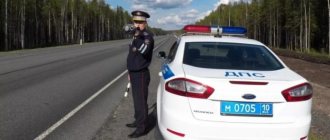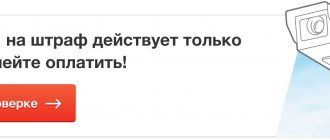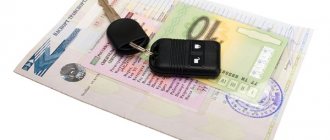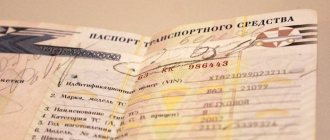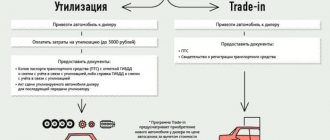Don't be rude
There is a certain Administrative Regulation, which was approved by the Ministry of Internal Affairs of Russia No. 664. It describes the principles according to which a traffic police officer should act when communicating with a driver. During the conversation, the inspector will behave politely, tactfully and show restraint and calm. The same is expected from the driver. The owner of the car must also address the employee as “you” and in every possible way refrain from rudeness and offensive statements addressed to the person during execution.
Such rules should be relevant for every driver. If the person driving believes that he has not violated anything and is confident in his justice, he must calmly explain that he is right to the employee, but in no case attack him with accusations. As practice shows, it will be much easier to resolve all disagreements in calm tones.
Duties of a traffic police officer
A large number of car owners sometimes do not know in what cases the traffic police inspector has the right to stop the car, the reasons for the stop and how he should behave. Let's try to figure it out in accordance with the traffic rules, the Administrative Regulations of the Ministry of Internal Affairs and the Code of Administrative Offenses. If previously the answers to these questions were general, now they are clearly stated in the Administrative Regulations, which are available to everyone. The introduction of new rules, according to the traffic police officers themselves, should make both drivers and inspectors more disciplined towards each other.
The administrative regulations of the Ministry of Internal Affairs of the Russian Federation are the main document regulating the actions of a traffic police inspector in the performance of his official duties.
In a conversation with road users, an employee must be polite, objective and tactful, address them as “you”, present their demands and comments in a convincing and understandable form, excluding the possibility of erroneous or ambiguous understanding, show calmness and restraint.
When addressing a road user, the employee must introduce himself, stating his position, special rank and surname, and then briefly state the reason and purpose of the appeal.
In the case of citizens’ appeals, the employee, having fulfilled the same requirements, is obliged to listen carefully, within the limits of his competence, take action on their applications or explain where to go to resolve the issue.
In all cases of restriction of the rights and freedoms of a citizen, the employee is obliged to explain to him the basis and reason for such restriction, as well as his rights and obligations arising in connection with this.
Traffic police officers are required to follow the procedure for obtaining evidence; failure to comply with this procedure indicates that the citizen has been brought to administrative responsibility illegally. Explain to the road user the essence of the violation he committed convincingly and clearly, with reference to the relevant requirements of the traffic rules and other regulations. When checking, handle citizens' documents carefully and do not make any marks on them in places not intended for this purpose.
When road users request reference information, the employee provides explanations only on issues related to the specifics of travel, clarification of the route, including the locations of medical institutions, internal affairs bodies and State Traffic Inspectorate units, as well as telephone numbers for obtaining information on the movement of detainees vehicles and locations of specialized parking lots for storing detained vehicles.
If conflict situations arise or at the request of road users, the inspector must explain the procedure for appealing his actions, in accordance with paragraph 167 of the Administrative Regulations, and also, upon request, must provide the location and telephone number of the duty or responsible official.
So, the traffic police inspector has the right to stop the vehicle in the following cases:
- Signs of violations of road safety requirements identified visually or recorded using technical means.
- Availability of data (orientations, information from the duty officer, other squads, road users, visually recorded circumstances) indicating the involvement of the driver and passengers in the commission of an accident, crime or administrative offense.
- Availability of data (orientations, information from operational and investigative records of internal affairs bodies, information from the duty officer, other squads, road users) about the use of the vehicle for illegal purposes or grounds to believe that it is wanted.
- The need to interview the driver or passengers about the circumstances of the accident, administrative offense, crime of which they were or are eyewitnesses.
- The need to involve a road user as a witness.
- The need to use a vehicle * (75).
- The need to temporarily restrict or prohibit the movement of vehicles.
- The need to ensure safe and unhindered passage of special purpose vehicles.
- Providing assistance in the unimpeded passage to the scene of emergency medical vehicles, as well as vehicles of operational and other emergency services involved in the liquidation of emergency incidents.
- The need to involve the driver and (or) passengers to assist other road users or police officers.
- Carrying out, on the basis of administrative acts of the heads of territorial bodies of the Ministry of Internal Affairs of Russia at the regional (district) level, heads of departments of the State Traffic Inspectorate of the territorial bodies of the Ministry of Internal Affairs of Russia at the regional (district) level, measures to prevent road accidents and reduce the severity of their consequences in order to protect life, health and property citizens, protection of their rights and legitimate interests, as well as the interests of society and the state * (76).
- A threat to road safety created by a malfunction or improper installation of technical means of traffic management, violation of the rules for carrying out repair work on the road, a natural disaster, an industrial (man-made) accident, a fire and other emergency circumstances, or a leak of hazardous substances.
- Checking documents for the right to use and drive a vehicle, documents for the vehicle and the cargo being transported.
- Checking the identity documents of the driver and passengers, if there is data giving grounds to suspect them of committing a crime or to believe that they are wanted, or if there is a reason to initiate an administrative offense case against these citizens, as well as if there are grounds for their detention in cases provided for by federal law.
A request to stop a vehicle is made using a loudspeaker device or a hand gesture, if necessary using a rod or disk with a red signal (retroreflector) aimed at the vehicle.
In this case, to attract the attention of road users, an additional whistle signal, special light and (or) sound signals can be used.
When giving signals to stop, the location where the vehicle will stop must be indicated.
It is not allowed to stop vehicles: on sections of roads where stopping them is prohibited by traffic rules, except in cases where such a stop is related to the need to suppress a crime, prevent a real threat of harm to the life, health and (or) property of road users, and also cases of marking a stop by a patrol car with special light signals and other means of regulating and organizing traffic. You can safely question the legality of your stop in such places. Even if you committed a violation, the actions of the traffic police inspector who stopped you will also be a violation of the law. And, as you know, a person who has committed a violation cannot be held accountable in violation of the procedure established by law.
Having stopped the vehicle, the employee must immediately approach the driver, introduce himself in accordance with the requirements of these Administrative Regulations, briefly state the reason for the stop, state the requirement for the transfer of documents necessary for verification or registration of an offense, and when involving the driver or passenger as a witness or attesting witness - explain rights and obligations provided for by the legislation of the Russian Federation.
If a traffic police inspector stops a vehicle unnecessarily, then he himself commits an administrative offense under Article 12.35 of the Administrative Code with a penalty of up to 20,000 rubles.
Based on the foregoing, we can conclude that compliance with basic rights and duties by traffic police officers will lead to interaction between road users and traffic police officers. As a result, there will be a reduction in conflict situations on the roads. Since situations on the roads are often contradictory, hence the conflicts and the hostile attitude of most drivers towards inspectors.
Don't demand
After stopping the vehicle, the inspector must introduce himself. To do this, the employee, when on duty, states his position, rank and last name from the very beginning. The inspector must show the ID and tell the driver why his vehicle was stopped. If the traffic police representative does not show his ID, the driver has the right to ask the employee to introduce himself and find out the reason for the delay. Every driver's request must be made tactfully.
It is important to remember that the person who is driving the car has the right to contact the officer with a request to explain in detail the reason for the stop, as well as to explain what laws the traffic police inspector is guided by. Administrative regulations require that the employee clearly answer the driver’s questions. If the owner of a car is arguing, it is best to communicate respectfully, focusing on the laws.
In what cases are documents required to be presented?
As already mentioned, of all the traffic controllers, only traffic police officers (traffic police, traffic police) have the right to demand documents from drivers. But what documents exactly do traffic police inspectors have the right to demand? There are only five types of such documents (clause 2.1.1 of the traffic rules):
- A permanent or temporary driver's license (with open categories and subcategories corresponding to the type of vehicle);
- STS, that is, a Certificate of registration of the vehicle with the State Traffic Safety Inspectorate (except for mopeds and trailers);
- Documents allowing the transportation of passengers and cargo by passenger taxis, as well as waybills, license cards and cargo documents. If bulky, heavy or dangerous goods are transported, then other documents required by law are required;
- Certificate of disability (for drivers whose cars have a special sign “Disabled”);
- MTPL insurance policy (if the vehicle is subject to compulsory insurance).
It turns out that an ordinary driver is obliged, at the request of a traffic police inspector, to present only a driver’s license, STS and a compulsory motor liability insurance policy. Other documents are needed only in special cases. Separately, it is worth saying that traffic police inspectors currently do not take away drivers’ licenses for violating traffic rules. This is only possible if there is suspicion about the authenticity of this document. In other cases, rights can be lost only after the relevant court ruling is issued.
Don't forget your rights and responsibilities
Many drivers begin to argue with traffic police inspectors due to the fact that they do not know enough traffic rules and the Code of Administrative Offenses “On Road Safety.” Before you get behind the wheel, it is important to study the rules of the road well and never break them. Additionally, it is recommended to learn the rules of communication with traffic police officers. For example, when an inspector stops a car, there is no need to immediately get out of the car; it is enough to wait until the traffic cop himself approaches you.
But there are exceptions, according to which it can be dangerous for an employee to be on the roadway and approach the car; in this case, he can address the driver from the opposite side of the car. For example, a traffic cop may ask you to move the car to another location. The main task of the driver in this case is to remain calm and not get irritated over trifles. It is also worth paying attention to the transfer of documents. When transferring documents, you should ensure in advance that they are without covers and unnecessary items. If these rules are followed, then no conflicts or incomprehensible situations will arise.
Inspection and inspection of the vehicle
Yes, these are different concepts! The inspection does not imply opening the doors, trunk, or any contact of the inspector with the car at all. It is carried out during special operations in order to detect malfunctions or check the compliance of the transported cargo with the accompanying documents.
As soon as the inspector asks “please open the trunk,” this is already an inspection. It can only be carried out in the presence of witnesses and with the drawing up of an appropriate protocol. In addition, such an event requires serious reasons - the presence of orientation, suspicion (reasonable) of transporting drugs, weapons, explosives, etc. You are not obliged to simply open the car to the inspector.
Don't make excuses
Often the driver does not agree with the offenses that are attributed to him. In this case, the car owner begins to make excuses, thereby showing that he is not guilty. But it is important to remember that the best proof of innocence is the law. Video footage of the offense can be used as evidence. Today, there are many gadgets that have a video recording function.
The traffic police officer must prove that the driver is guilty, so the driver can simply say that he will not admit his guilt and will not incriminate himself. If a protocol is drawn up, the offense is described and all rights and obligations are explained. The protocol indicates the time and place of the offense; it is worth paying attention to the date, position and surname of the employee who compiled the document. The protocol may indicate its own evidence and arguments that will indicate that the driver is right.
The owner of the car will be required to indicate in the protocol a phrase such as “I do not agree with the violation. I didn’t violate any traffic rules.” It is very important to ensure that traffic police officers use the term “driver” and not “violator” in the protocol.
What the law says about how to communicate with traffic police officers
According to the law, an inspector is an official exercising his powers within the established competence. On the other side, there is the driver. Communication between them must take place on the basis of equality and under no circumstances is it allowed to go beyond the limits of the law, this is punishable. Any relationship between an official and a driver was regulated in Order of the Ministry of Internal Affairs of Russia No. 185 of 02.03. 2009.
The document sets out the following duties of a police officer:
- act only within the limits established by law;
- serve conscientiously and perform all official duties;
- monitor the observance of public order, stop impending offenses and take action on those already committed;
- treat any persons with respect (citizens of the Russian Federation, stateless persons or foreign citizens);
- When communicating, observe restraint, tact, politeness and objectivity.
Naturally, this type of inspector can only evoke positive emotions, so you should behave appropriately. Behavior should be decisive and confident, but not defiant.
IMPORTANT !!! It is worth remembering that, first of all, the inspector is on duty and for failure to fulfill his duties, disciplinary action may be imposed on him. Therefore, if there really was a fact of committing an offense, there is no need to make a circus out of the dialogue.
In addition, any indecent statements towards an official are punishable:
- Art. 20.1 Code of Administrative Offenses – fine up to one and a half thousand rubles. or arrest for up to 24 hours for non-public statements and insults in public places;
- Art. 319 of the Criminal Code of the Russian Federation - insults towards a person during service, or because of its performance - is punishable by a fine of up to forty thousand rubles, compulsory labor for up to three hundred and sixty hours, or correctional labor for up to one year.
Such consequences are unlikely to be desirable, so you should think several times before saying anything in front of employees.
If there is a fact of committing a violation of traffic rules, you will need to fill out the appropriate part of the protocol and then proceed according to one of the examples:
- admit your guilt, take a copy of the decision and pay the fine within the period established by law;
- not admit the guilt of the act, make attempts to challenge the inspector’s decision. The protocol must contain a note indicating disagreement with the decision, and then a trial will follow. A successful outcome will require as much evidence as possible.
If an employee's actions deviate from the law in any way, you cannot become like him, you should continue to remain calm and speak in accordance with the law.
Don't be unfounded
Arguing with the inspector and not having any facts will be an extremely wrong decision. It is advisable to always confirm your position by referring to generally accepted norms. If the driver knows the laws very well, then it will be difficult for the traffic police officer to argue with him.
For example, if the owner of a car was stopped while driving and accused of not wearing a seat belt, you could ask the inspector to provide photographs that would show this. If there is no such evidence, then you can refer to Art. 12.6 of the Code of Administrative Offenses of the Russian Federation, which states that the driver must be buckled up only while driving. After stopping, the driver can unfasten his seat belt to get documents, and he cannot be fined for this.
Most motorists install DVRs in their cars. This technique allows you to film everything that happens in the cabin and beyond. Therefore, with such a device it turns out to be much easier to prove that you are right. Various situations may arise on the road, so the best thing to do when stopping the car is to explain to the inspector how everything really happened.
Every motorist must have legal literacy. This will help resolve many controversial issues, based on obvious facts, and for this there is no need to make any unfounded announcements. When communicating with a person, you should not be guided by emotions; first of all, politeness and legal norms will come to the rescue.

